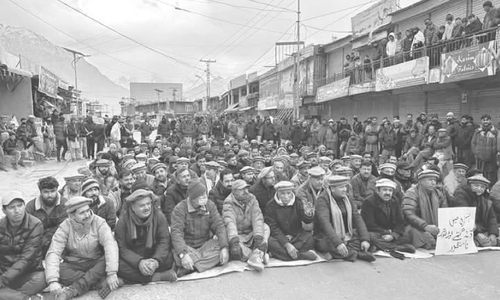LONG reviled as a state aiding terrorists, Pakistan has eventually started taking concrete steps to refurbish its image by delivering on its promise of supporting intra-Afghan talks on ending the 14-year conflict in the neighbouring country.
Last week’s groundbreaking meeting in Murree between Afghan government and Afghan Taliban representatives, who agreed to hold another round of negotiations after Ramazan, has come as happy tidings for President Ashraf Ghani.
The Afghan leader has expended a lot of political capital trying to nudge Pakistan to convince the insurgents into launching a substantive discourse with his administration. He has stayed the course despite aversion from jingoistic elements within the unwieldy ruling coalition.
The Taliban’s summer offensive has been a huge embarrassment to a government that has consistently sought to be on a friendly footing with Islamabad. As Pakistan delayed translating its pledge into action, foes mounted tremendous pressure on the president for his regional outreach efforts.
Coming just in the nick of time, the Murree meeting has vindicated Ghani’s stance, helping defuse Kabul-Islamabad tensions over the reconciliation drive. Agreement on holding another round of discussions after Eid has silenced for now detractors of the peace overtures.
Nonetheless, Pakistan’s role in pushing the peace bid has spurred hopes for lasting stability in the country. Content with the development, Ghani will jointly inaugurate the ministerial conference of the Heart-of-Asia process, scheduled for December in Islamabad.
War-weary Afghans are craving for peace.
For the first time during their insurgency, the Taliban look to be sharply split on direct talks with the Afghan government. Once their main foreign prop, Pakistan has started bulldozing the fighters — like never before it seems — to talk peace.
In a knee-jerk reaction, the movement billed the meeting as ‘Pakistani roulette’ involving some individuals from the group to speak in their personal capacity. Intriguingly, the Taliban moved swiftly to remove this hard-hitting statement from their website.
Some analysts dub the Taliban negotiators as stooges of Pakistani intelligence, which has, they say, been scrambling to negotiate with the government in Kabul on behalf of the outfit or hijack the process. Even a member of the Taliban’s Qatar bureau called the meeting a step in the wrong direction.
On the other hand, both Kabul and Islamabad tend to put a positive spin on the talks, hailing them as a major breakthrough. Both have characterised the negotiators as duly mandated by their respective sides.
Mullah Mansour, who supported the Pakistan-sponsored talks, is reportedly in a ruthless power struggle with senior rebel commanders. Deemed to be a close confidant of the Taliban’s reclusive leader Mullah Omar, he is trying to win over more loyalists within the increasingly polarised movement.
It is a bit too early to say that the internecine differences, coupled with a growing antipathy towards Islamabad and the self-styled Islamic State, will be a severe blow to the guerrilla group. Given the fact that similar contacts have lately taken place in Qatar, Saudi Arabia, China and Norway, the questions raised about the Taliban negotiators’ credentials appear to be plain nonsense.
There are broad indications of the Kabul government’s willingness to free Taliban detainees if they promise to halt civilian massacres. The likelihood of a temporary ceasefire also figured at the meeting, whose next round will focus on the specific modalities of ending the conflict.
What is certain is that the war-weary Afghans are craving for a perceptible decline in the pervasive violence — an aspiration that will test the Taliban delegates’ decision-making power. Although Pakistan’s role as a facilitator is seen as ambivalent, there are hazy signs of a shift in Islamabad’s policy.
While rethinking its ties to the Taliban, Islamabad looks to be supportive of a negotiated end to the war in Afghanistan. The presence of Chinese and American representatives at the 2+1+2 initiative is also reminiscent of the change in Pakistan’s attitude.
Just like China, the US has an abiding interest in South Asian stability to avert Al Qaeda’s re-emergence, contain IS expansion and ensure the opportunity is not gamed away in Afghanistan — goals which cannot be realised without Pakistan’s cooperation.
The contact is a boon to Ghani, though there have been no dramatic results. But the confidence-building measures discussed will help the president fend off denigrating responses from his predecessor and others.
To nurture the process, the Obama administration will have to alter a politically motivated calendar for a complete pullout from Afghanistan, which still has a long and hard road ahead. Also needed is continued prodding from Pakistan, China and the US to keep the talks going. Concerned at the possible impact of instability in Afghanistan on Muslim separatists in Xinjiang, Beijing is encouraging Islamabad to work in tandem with Kabul.
The writer is a freelance journalist based in Peshawar.
Published in Dawn ,July 14th, 2015
On a mobile phone? Get the Dawn Mobile App: Apple Store | Google Play











































